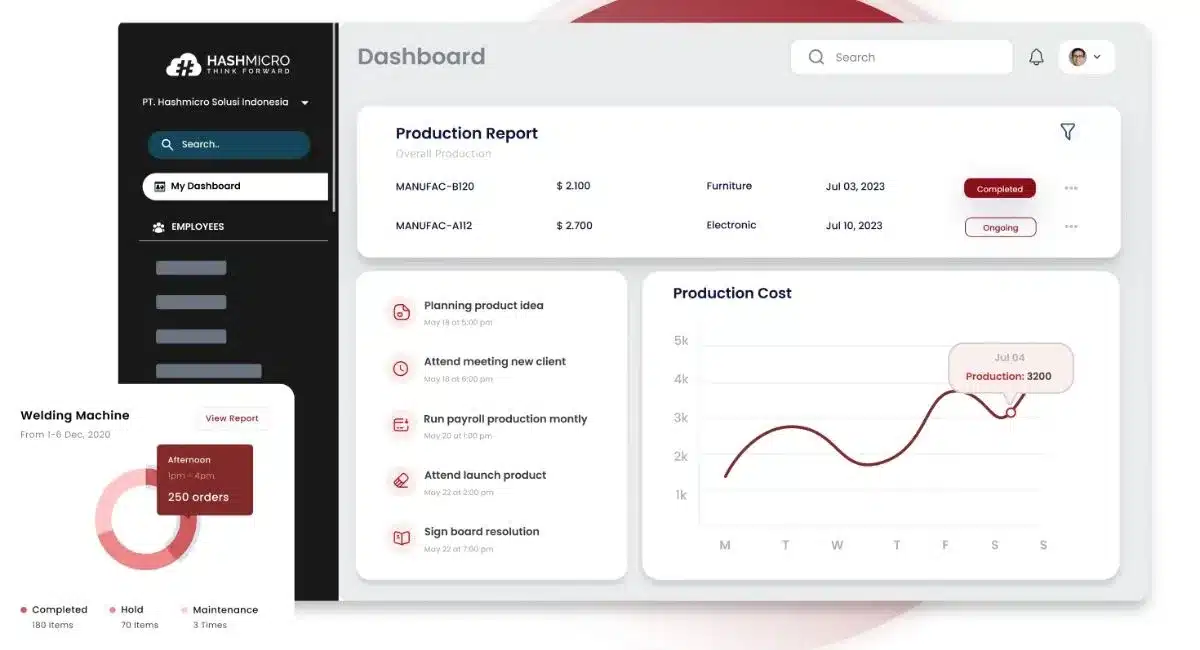Process manufacturing is a production method that transforms raw materials into finished goods through chemical, physical, or mechanical processes. This process manufacturing software solution allows you to optimise production schedules, manage inventory, and maintain quality control.
Without the right manufacturing software, businesses face challenges like inconsistent product quality, inventory management issues, and costly equipment downtime. Variability in raw material inventory quality also can disrupt production, leading to delays and increased costs.
A Deloitte study highlights the importance of technological investment. It emphasizes that the Philippine government is encouraged to invest in technology and infrastructure to support higher-value manufacturing.
Such investments can boost productivity and integrate local industries into the global supply chain. This perspective underscores the critical role of advanced manufacturing solutions in enhancing operational efficiency and competitiveness worldwide.
This article provides a comprehensive guide to process manufacturing, covering its definition, benefits, and the industries that rely on this production method. By understanding these aspects, businesses can enhance operational efficiency and overall productivity.
Table of Contents
Key Takeaways
|
What is Process Manufacturing?
Process manufacturing is a production method that converts raw materials into finished goods through chemical, physical, or mechanical processes. It involves transforming substances using mixing, heating, and chemical reactions to produce products that cannot be separated into original components.
Manufacturing execution systems work by integrating various stages of production into a seamless workflow. These systems use advanced software to monitor and control every aspect of production, from raw material handling to final product packaging, ensuring efficiency, consistency, and compliance with industry standards.
Key Benefits of Process Manufacturing
Understanding the key benefits of processing industry is essential for businesses looking to optimize their production processes and stay competitive. By leveraging the right strategies and technologies, companies can significantly improve their operational efficiency, product quality, and profitability.
Here are some main benefits of process manufacturing:
1. Maximizing cost efficiency
Process manufacturing is cost-effective as it uses fewer resources to produce more products, saving money. It integrates with accounting software for manufacturing, and enables mass production, leading to economies of scale and lower per-unit costs. Streamlining operations and reducing waste further cut overall expenses. This efficiency helps companies maximize profitability.
2. Seamless cost management
With process manufacturing, tracking and allocating costs becomes straightforward due to the continuous nature of production. This clarity in cost management helps better budgeting, pricing strategies, and financial planning.
3. Boosting team collaboration and morale
Process manufacturing significantly enhances communication and boosts morale in the workplace. When employees clearly understand their roles, their performance improves, increasing job satisfaction.
This clarity also reduces errors, creating a more efficient and positive work environment. Overall, a well-implemented process manufacturing system fosters better collaboration and a happier workforce.
4. Consistent and simplified product line
Process manufacturing concentrates on a limited range of products, simplifying quality control. This ensures consistent quality, keeping customers satisfied and loyal. The standardized processes make inventory management and production more efficient. As a result, businesses can reliably meet customer expectations. Implementing asset management software can also boost the manufacturing process.
5. Enhancing workplace safety
Processing industry enhances workplace safety by following strict safety protocols. This is crucial for industries like chemical and pharmaceutical factories in the Philippines. These systems continuously monitor process making to prevent accidents and protect employees.
Process manufacturing also offers improved efficiency and cost savings, and paired with advanced manufacturing, it offers a valuable choice for businesses looking to boost safety and productivity.
Types of Manufacturing
Manufacturing can be broadly categorized based on the production processes and the nature of the end products. The primary types include process manufacturing, discrete manufacturing, job shop manufacturing, batch manufacturing, and continuous manufacturing.
To understand manufacturing better, it’s essential to compare two main types: process and discrete. These approaches are different and help in choosing the right manufacturing strategy.
Process Manufacturing vs. Discrete Manufacturing
Process manufacturing involves transforming raw materials into finished goods through continuous or batch production. This method is ideal for the food, beverage, pharmaceutical, and chemical industries.
In these industries, products are created through processes that result in final goods that cannot be broken down into their original components. For example, once food or chemicals are processed, they cannot be separated into their initial ingredients.
On the other hand, discrete manufacturing focuses on producing distinct, individual items. This approach is commonly used in the automotive, electronics, and furniture industries. Each unit produced in discrete manufacturing can be easily identified, counted, and broken down into its essential components.
Continuous Process Manufacturing vs. Batch Process Manufacturing
Process manufacturing has two main subtypes: continuous and batch. The continuous processing industry involves an uninterrupted flow of production, which ensures consistent quality and high efficiency for large-scale operations. This method is ideal for industries that require a steady output of homogeneous products.
On the other hand, batch process manufacturing produces goods in specific, discrete batches. This approach offers greater flexibility and control, making it beneficial for producing smaller quantities of specialized products.
Each method has its own set of advantages. The choice between continuous and batch process manufacturing depends on the specific needs and goals of the production process.
Choosing between process and discrete manufacturing affects how you manage production and inventory. Knowing this can help you pick the best manufacturing software for your business in the Philippines.

Process Manufacturing Industries
Process manufacturing is critical in many sectors, especially in the Philippines. It ensures consistency, quality, and efficiency in work. Let’s look at three big industries where the process production example is important.
1. Food & Beverage, Food Processed Industry: The food and beverage industry transforms raw ingredients into consumable products through mixing, heating, and packaging. ERP for manufacturing helps maintain product quality, streamline operations, and ensure food safety compliance.
2. Pharmaceutical Industry, Chemical, Tire, and Process Industries: The pharmaceutical, chemical, tire, and process industries produce essential products through chemical reactions and precise formulations. Process of production software enhances consistency, meets stringent regulations, and reduces production costs.
3. Cosmetics and Personal Care: The cosmetics and personal care industry creates beauty and hygiene products through blending and emulsification. Process manufacturing software ensures product safety standards, effective quality control, and smooth supply chain operations.
4. Nutraceuticals: The nutraceutical industry produces dietary supplements and health products through extraction and blending. Process manufacturing inventory software guarantees product purity and compliance while optimizing inventory management.
5. Paints and Coatings: The paints and coatings industry formulates protective and decorative finishes by mixing pigments and binders. Process manufacturing software aids in managing chemical waste, maintaining product quality, and meeting environmental standards.
6. Semiconductor Fabrication: The semiconductor fabrication industry produces electronic chips through exact processes like lithography and etching. Process manufacturing software ensures a contamination-free environment and high product quality while controlling production costs.
7. Specialty Chemicals: The specialty industry creates custom chemicals for specific applications through complex reactions and purification. Process manufacturing software enhances product consistency, effectively manages hazardous waste, and ensures regulatory compliance.
8. Steel and Aluminum Processing: The steel and aluminum processing industry produces metal products through smelting, casting, and rolling. Process manufacturing software optimizes energy use, ensures product strength and quality, and controls emissions.
9. Textiles: The textile industry produces fabrics through spinning, weaving, dyeing, and finishing. Process manufacturing software maintains color consistency and quality control while efficiently managing waste.
How HashMicro Manufacturing Solution Helps with Process Manufacturing
HashMicro Manufacturing Software is a leading solution provider for various industries in Indonesia. It offers comprehensive tools designed to streamline and enhance manufacturing, ensuring efficiency and high-quality output. With HashMicro, companies can manage their production operations more effectively and stay competitive.
If you are interested in HashMicro’s software solutions, you can try a free demo to learn more about how this vendor can benefit your business. The demo provides an in-depth look at the features and capabilities, showing firsthand how the software can address your specific manufacturing needs.
Here are some of the key features provided by HashMicro’s manufacturing software:
- Manufacturing Production Scheduling: Using this feature, you can optimize your production schedule with accurate forecasting based on demand history and intuitive graphs, enabling better production decisions.
- Bill of Materials (BoM) Management: This feature allows you to create secret recipes and control access to sensitive BoM information, ensuring only authorized personnel can access or create these secret BoMs to maintain confidentiality.
- IoT Integration for Conveyor Belt Sensors: By leveraging this feature, you can detect issues such as bottlenecks and product damage, send alerts, and provide analytics data to improve production efficiency and decision-making.
- Subcontracting and Quality Control: This feature ensures quality and timely production, manages subcontracting processes efficiently, and maintains on-time order completion, thus enhancing production management.
- Production Simulation and Gantt Chart Scheduling: Using these features, you can simulate finished goods production, visualize schedules with Gantt charts, and ensure better planning and time management.
- Cost Management and OEE Tracking: This feature helps ensure the availability of raw materials and resources, optimizes the production process through better planning, and reduces the risk of material shortages and production disruptions.
- Comprehensive Inventory and Reporting Management: This feature allows you to manage real-time stock input/output, multiple finished goods, and byproducts and gain insights with detailed reports on production metrics. It also helps in production planning, machine and labor scheduling, and identifying schedule conflicts.
In addition to its outstanding features, HashMicro offers flexibility in system integration with various modules and third-party systems. The software also provides easy customization, allowing you to tailor features to fit your business needs ideally. This adaptability makes HashMicro an excellent choice for businesses seeking a robust and versatile manufacturing solution.
Conclusion
Many industries use process manufacturing, such as food, drinks, medicines, and chemicals. Each one shows how this method improves and increases efficiency, which is why it’s so essential for businesses to use software to streamline their process manufacturing operations.
HashMicro’s Manufacturing Software is one of the best software solutions available to help businesses of all sizes improve their manufacturing efficiency. It offers seamless integration with various systems, customizable features tailored to specific business needs, and an intuitive interface that makes it easy for users to navigate and operate.
To explore how HashMicro can benefit your business, get the trial system and consult with their professional team to understand how their solutions can be tailored to your specific needs.


























